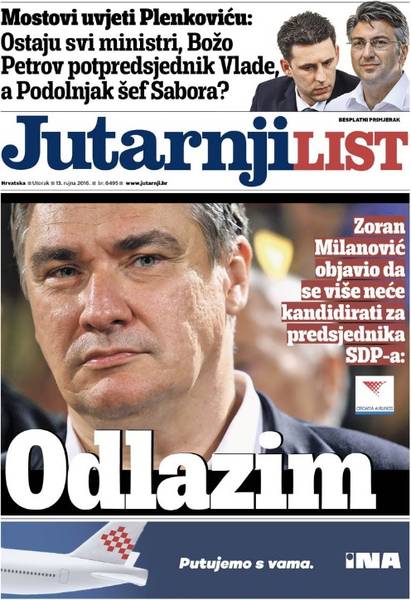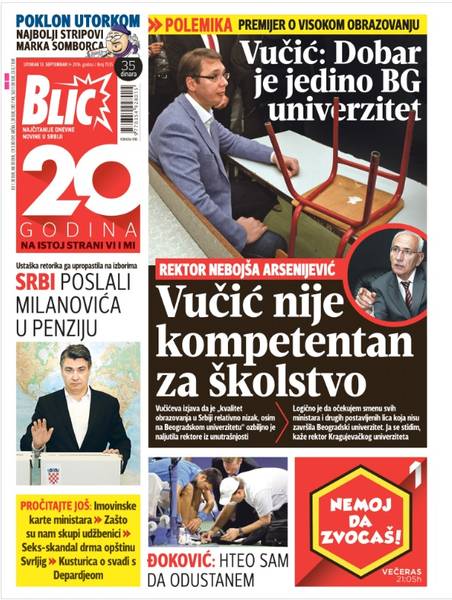Milanović Stepping Down Is a Major Topic in Regional Press
Adelina Marini, September 13, 2016
 Results of the snap elections in Croatia of September 11 are the leading subject for media in the region of former Yugoslavia. For most media the main piece of news is the announced stepping down of former Prime Minister Zoran Milanović from the leader’s seat in the Social Democratic Party (SDP). In a commentary for Jutarnji list, Nino Đula writes that the SDP lost the elections the moment it gave Milanović another term. The Vecernji list correspondent to Brussels, Tomislav Krasnec, writes in an analysis that Zoran Milanović lost due to Serbian votes. The journalist quotes his own sources from the party, who made telephone polls with voters from regions with predominantly Serbian population and many of them stated they would not vote for Zoran Milanović this time because of his statements that his grandfather was an Ustaša and because of him calling the Serbian people “a bunch of weaklings”.
Results of the snap elections in Croatia of September 11 are the leading subject for media in the region of former Yugoslavia. For most media the main piece of news is the announced stepping down of former Prime Minister Zoran Milanović from the leader’s seat in the Social Democratic Party (SDP). In a commentary for Jutarnji list, Nino Đula writes that the SDP lost the elections the moment it gave Milanović another term. The Vecernji list correspondent to Brussels, Tomislav Krasnec, writes in an analysis that Zoran Milanović lost due to Serbian votes. The journalist quotes his own sources from the party, who made telephone polls with voters from regions with predominantly Serbian population and many of them stated they would not vote for Zoran Milanović this time because of his statements that his grandfather was an Ustaša and because of him calling the Serbian people “a bunch of weaklings”.
The newspaper reports that 106 thousand less people voted for the People’ coalition, compared to last year’s elections, while losses for the HDZ are 64 thousand. In other words, SDP voters have decreased to 86.68% of last year’s result of the party, while the HDZ got the votes of 91.4% of the voters, who supported them last year. Rijeka’s Novi list, which traditionally supports the SDP, writes in a sharp commentary that the biggest loser in these elections is namely Zoran Milanović. “Plenković did not beat Milanović, but Milanović – and this is nothing new – is his own greatest enemy and these elections confirmed that. The mama-doctor, grandpa-Ustaša, and a bunch of weaklings would never have come to the minds of the HDZ headquarters, the paid marketing agencies, and opinion leaders, who worked on behalf of Plenković, Milanović stuck a knife in his own back”, concludes Branko Mijić in Novi list.
"Loser" is the headline of an article in the Bosnian Dnevni avaz, which says that whenever someone forcibly pushes forward snap elections and then loses them, the only option left to him is resignation. The newspaper obviously advocates for a wide coalition between the SDP and HDZ, which without Milanović will be not just possible but beneficial for the region. “At a time when Europe is boiling, when relations between Balkan neighbours are getting more and more tense, a wide coalition between the SDP and the HDZ in Croatia would be one more step towards stabilisation”, writes the Bosnian daily.
Serbian analyst from the Centre for Foreign Policy Aleksandra Joksimović believes that a possible government headed by the HDZ is the most acceptable option for Serbia, reports Serbian Blic, for if could bring a release of tension between Zagreb and Belgrade. “Grabar-Kitarović [president of Croatia] and Plenković have known each other long and are able to establish cooperation. If a moderate foreign minister is found in this triangle, I think things could progress to lessening of tension, most of all between Belgrade and Zagreb, which in turn will open a possibility for additional cooperation”, believes the analyst.
Some Croatian media, however, are concerned about having too long coalition negotiations. tportal reports, that the budget for next year is already late. "As things stand at the moment, we can once more expect arduous negotiations for the formation of a government. Should the situation of the previous elections be repeated, the entire process could take more than two months, which means that we can reasonably expect a new government somewhere in the beginning of December”, writes the online medium. Keeping in mind that these elections were held outside of usual timeframes, the procedure for the drafting of the budget is already running late. Marina Tkalec, expert in the Economic institute, is quoted by tportal in soothing that there is no problem. “Our public finances have never been better, thanks to the interim government, which is doing an excellent job”, she claims.
At the same time, Jutarnji quotes Croatian analysts, who are glad of the possibility that incumbent Finance Minister Zdravko Marić could keep his seat. “Concerning public finances, Zdravko Marić as minister is the best news of these elections”, claims his predecessor from the SDP Boris Lalovac. “The fact that the government will be entered by at least two excellent specialists - Zdravko Marić and Ivana Maletić - is a very loud and clear signal that high quality will be looked for in ministers for the new government”, writes the newspaper. The Economic institute analyst Maruška Vizek is critical. In her opinion, no large reforms could be expected from the new government. It is difficult to expect that exactly a HDZ cabinet will start an administration reform, or a reform of the governance of state assets and state owned enterprises.
The EU fears enlargement
 The Jutarnji list correspondent to Brussels, Augustin Palokaj, writes in an analysis today that the EU will attempt to show it is just as engaged in its enlargement, for it believes it a guarantee for long lasting peace. Enlargement should not be viewed solely in terms of finances and economics, he says. The problem is that none of the rich and developed states like Norway, Switzerland, or Iceland wish to get in the Union, while there are mainly fragile and poor countries from the Balkans and Turkey heading for it. “The very thought that any of these states could soon be an EU member causes fear in some Western diplomats, cynical laughter in others, and most are attempting to diplomatically make the impression that the process continues, that nothing is changing, and that every state that wishes so will enter the EU the moment it complies with the prerequisites and when member states agree.”
The Jutarnji list correspondent to Brussels, Augustin Palokaj, writes in an analysis today that the EU will attempt to show it is just as engaged in its enlargement, for it believes it a guarantee for long lasting peace. Enlargement should not be viewed solely in terms of finances and economics, he says. The problem is that none of the rich and developed states like Norway, Switzerland, or Iceland wish to get in the Union, while there are mainly fragile and poor countries from the Balkans and Turkey heading for it. “The very thought that any of these states could soon be an EU member causes fear in some Western diplomats, cynical laughter in others, and most are attempting to diplomatically make the impression that the process continues, that nothing is changing, and that every state that wishes so will enter the EU the moment it complies with the prerequisites and when member states agree.”
Palokaj further writes that it is expected that on September 20th the Union’s foreign ministers will show a green light for Bosnia and Herzegovina receiving a candidate state status. The curious thing is, he writes, that this will happen at the same time when there will be a referendum held in Republika Srpska, which many believe will lead to the future secession of this entity. “The EU wants, right at a time of fear of a possible impact of the RS referendum over the stability of BiH, to send positive messages for progress on the way towards the EU”, continues the journalist for Jutarnji.
In Serbia, Foreign Minister Ivica Dačić protested against a statement by the German State Minister for Europe Michael Roth during a lecture in the Faculty of Political Science in Belgrade, that if Serbia is firmly set on being a part of the EU and not Russia, Germany will support it in this direction. This, however, does not mean that Serbia should sever its historical, cultural and economic, or political ties with countries like Russia, he also said, quoted by the Serbian national television RTS. “Roth’s words are inappropriate and offensive”, reacted Mr Dačić. “Serbia and Russia are traditional friends, but when did Serbia express any intention of being a part of Russia? What is this vulgarisation of Serbia’s foreign relations?”, asked Dačić, quoted by the RTS.
Macedonia with new requirements
Macedonian Utrinski vesnik reports that this year’s progress reports on candidate states will once again be published late – on November 9th. It is expected that in the report on Macedonia the European Commission will recommend the opening of negotiations for the 8th year in a row, but this will be linked to holding fair elections in December and the implementation of the Przino agreement. Utrinski comments that the EC for the first time hints that it could not recognise the elections in Macedonia if they do not comply with requirements and will not stop just at an assessment of whether the elections are credible or not.
The newspaper says that the date November 9th is not very certain, for to this European Commission EU enlargement is not a main topic, for it is the Commission’s position that there will be no enlargement during its term.
Kristalina Georgieva the new opponent of Vuk Jeremić?
This is the headline of an article in the Serbian Vecernje novosti, in which it is reported that due to quarrels between Berlin and Moscow around the election of a Secretary General to the UN, instead of Irina Bokova, Bulgaria might nominate a different candidate – Kristalina Georgieva. The newspaper writes that the nomination of the EC vice-president is expected today, which means that the Serbian candidate Vuk Jeremić will gain a new opponent. In the fourth round of votes on Sunday Bokova dropped to the fifth position, following Antonio Gutiérrez, Miroslav Lajčák, Vuk Jeremić, and Srgjan Kerim. The newspaper quotes the statement of the spokesperson of the Russian foreign ministry, Maria Zakharova, that Germany was looking for Moscow’s support for Georgieva’s candidacy during the G20 meeting. Novosti does not report, however, that this statement was denied by official Berlin.
Translated by Stanimir Stoev
 Bakir Izetbegovic, Andrej Plenkovic | © Council of the EU
Bakir Izetbegovic, Andrej Plenkovic | © Council of the EU Aleksandar Vucic, Recep Tayyip Erdogan | © Serbian Presidency
Aleksandar Vucic, Recep Tayyip Erdogan | © Serbian Presidency Jean-Claude Juncker, Zoran Zaev | © European Commission
Jean-Claude Juncker, Zoran Zaev | © European Commission